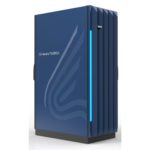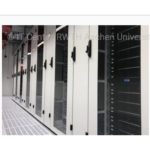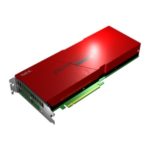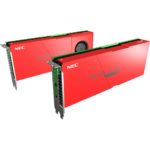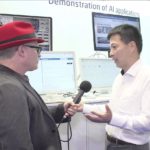Today NEC announced that it received an order for an NEC SX-Aurora TSUBASA supercomputer with a value of 50 Million Euro from the Deutscher Wetterdienst (DWD), the German weather forecasting service. “The new HPC system will enable the development of seamless prediction of severe weather events, including thunderstorms or heavy rain. The system combines forecasting based on observations with very demanding numerical weather prediction models in order for a more precise prediction of the development and the tracks of such small-scale weather events up to twelve hours into the future.”
NEC Delivers HPC Cluster to RWTH Aachen University in Germany
Today NEC announced that RWTH Aachen University in Germany has started operations of a new HPC cluster. Called CLAIX-2018 the system augments the university’s existing CLAIX-2016 installation. “RWTH Aachen is one of the most renowned universities in Germany, and this project is a lighthouse project not only for the HPC datacentre, but also for NEC,” said Yuichi Kojima, Vice President HPC EMEA at NEC Deutschland.
NEC to Host Aurora Forum on Vector Computing at ISC 2019
NEC will host their Aurora Forum at ISC 2019. Designed for developers and users SX-Aurora TSUBA vector computing technology, the The half-day meeting takes place June 17 in Frankfurt, Germany. “The NEC SX-Aurora TSUBASA is the newest in the line of NEC SX Vector Processors with the worlds highest memory bandwidth. Implemented in a PCI-e form factor, the NEC processor can be configured in many flexible configurations together with a standard x86 cluster.”
NEC-X Opens Vector Engine Data Acceleration Center in Silicon Valley
Today NEC-X launched the Vector Engine Data Acceleration Center (VEDAC) at its Silicon Valley facility. This new VEDAC is one of the company’s many offerings to innovators, makers and change agents. The NEC X organization is focused on fostering big data innovations using NEC’s emerging technologies while tapping into Silicon Valley’s rich ecosystem. “We are gratified to see the developing innovations that are taking advantage of the cutting-edge technologies from NEC’s laboratories.”
NEC Steps Up with AMD EPYC Servers for Aerospace and Automotive
In this video, NEC’s Oliver Tennert and AMD’s Dan Bounds describe how the two companies are developing high density computing solutions using AMD EPYC processors and liquid cooling for the aerospace and automotive industries. “More and more datacenters put a lot of efforts into reducing their cooling costs even further by making the leap to direct hot-water cooling. In this concept the water has an inlet temperature of up to 45 degrees Celsius and directly cools CPU, memory and other equipment by elements that are part of a closed water circuit. NEC works together with AMD to enable the best solution for each datacenter.”
Video: NEC Accelerates Stanford DAWN Project with Vector Computing
Today NEC Corporation announced that it is supporting the Stanford DAWN project, an initiative to simplify the building of AI-powered applications, by providing a cluster of new “SX-Aurora TSUBASA” vector computers for research in the area of Artificial Intelligence. “We are very pleased to support the Stanford DAWN project. We hope to help demonstrate the value of vector computing to the advancement of AI domains,” said Yuichi Nakamura, Vice President, NEC Central Research Laboratories.
NEC Accelerates Machine Learning with Vector Computing
In this video from ISC 2018, Takeo Hosomi from NEC describes how vector computing can accelerate Machine Learning workloads. “Machine learning is the key technology for data analytics and artificial intelligence. Recent progress in this field opens opportunities for a wide variety of new applications. Our department has been at the forefront of developments in such areas as deep learning, support vector machines and semantic analysis for over a decade. Many of our technologies have been integrated in innovative products and services of NEC.”
NEC Accelerates HPC with Vector Computing at ISC 2018
In this video from ISC 2018, Oliver Tennert from NEC Deutschland GmbH introduces the company’s vector computing technologies for HPC and Machine Learning. “The NEC SX-Aurora TSUBASA is the newest in the line of NEC SX Vector Processors with the worlds highest memory bandwidth. The Processor that is implemented in a PCI-e form factor can be configured in many flexible configurations together with a standard x86 cluster.”
NEC and Quobyte Power HPC Storage at HLRS in Germany
Today NEC Deutschland GmbH and Quobyte announced the deployment of a complete storage solution at HLRS in Germany. The HLRS facility is one of the top 20 supercomputing sites in the world and is amongst the top three in Germany. The facility is used by researchers and industry groups who typically run HPC workloads focused on Computational Fluid Dynamics (CFD), Physics, Transport and Climate, Structural Mechanics, Chemistry, Bioinformatics, and Electrical Engineering.

